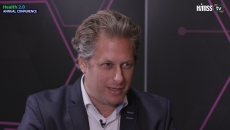Artificial Intelligence
Hal Wolf, president and CEO of HIMSS, says using AI infused into clinical decision support can provide healthcare professionals and patients/consumers with the right information pathways and treatment plans to enable better care outcomes.
Gyant CEO Pascal Zuta describes how his company's AI platform can help physicians perform tasks only they can do, thus improving workflow.
Real-world evidence drawn from unstructured clinical notes was more accurate in algorithmic prediction of coronary artery disease than structured data, a new study in JAMIA shows.
SPONSORED
In most industries, change or evolution isn’t a gradual process.
Promising AI tools can enable physicians to perform more effectively across the work that they do, says Dr. Jesse Ehrenfeld, board of trustees chair for the American Medical Association.
Genomic medicine researchers at the laboratory have been using artificial intelligence, developed as part of Microsoft's Project Hanover, to help manage the vast amount of research data needed to power its precision oncology initiatives.
The leading-edge technology could provide vastly faster power and processing speeds, and enable fundamentally different algorithmic search and data homogenization strategies.
The two funds are the Artificial Intelligence and Digital Translation Fund, which boasts initial funding of $30 million over five years, and the Translational Innovation Fund, which will provide $50 million in funding over six years.
The edge computing technology's neural network algorithms can help drive workflow efficiency, detect gaps in care and deliver real-time intelligent notifications to staff, the AI developers say.
The Mayo Clinic's new 10-year partnership with Google Cloud aims to look for the next breakthroughs that diagnose and treat complex and serious illness or conditions more effectively, says CIO Cris Ross.




